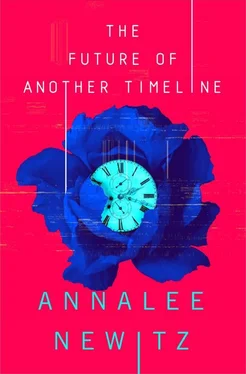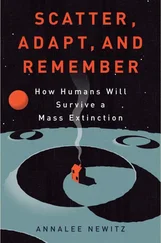Morehshin nodded. “We need to follow this thread back to its beginning. It’s the only way to survive.”
Several other Daughters were nodding too.
We called a vote and it was unanimous. Morehshin would come with me to fight the Comstockers, without using violence. Whether we faced a strong divergence, a plot to destroy the Machines, or simply a melee in the edit war, we were on the same side. Unless Morehshin decided to go all Great Man assassin on me. I glanced at her, registering that her irises had no imperfections in them at all. It was as if she’d been engineered. I looked down at my hands, the knuckles slightly swollen, skin creased. Would I be able to stop her, if Morehshin decided murder was the only way? Then, guiltily, I wondered if I’d actually want to.
We arrived in Flin Flon two days later. I still had official permission to continue research on the Columbian Exposition, and I wrote Morehshin into the meager budget as a research assistant. After the usual flight delays, followed by scheduling difficulties at the Machine, we were in position. Rumor spread quickly that a traveler from the future would be demonstrating new functionality, and several off-duty techs showed up to watch. This was a lot more unusual than a traveler covered in cyanobacteria. Many people didn’t believe group travel would ever be possible. I braced myself for a disappointing plan B, where the wormhole didn’t open and I had to go through alone.
Around us, the tappers thrummed to life, four joining in to beat a light rhythm on the rock. Morehshin put her left arm around my waist and scratched the air overhead with her free hand. A black square materialized beneath her fingers, like she’d revealed a circuit breaker box hidden in the fabric of reality. Instead of switches and buttons, the square glowed with thin strands of rippling fluid. I could hear a few gasps in the room, and I realized that my own mouth was hanging open. Abruptly, Morehshin mashed her hand into the square, and her fingers took on a faint luminescence. I thought of all the rules I’d memorized in school about how the Machine worked. One of the best-known limits was that it never sent multiple contemporaries to the same place at the same time. Trying to send several people sequentially to the same time didn’t work either—it had been tried repeatedly, with occasionally disastrous results.
Morehshin’s arm tightened around me, the floor rushed with silty water, and the air exploded into wormhole nothingness. Then we stood, still touching, in a dark, smoky cabin. We’d made it back to 1893. Together.
Irvine, Alta California (1992 C.E.)
A week before school started, my father called a family meeting to discuss what he called “our agreement.” Ever since fourth grade, when teachers started giving letter grades instead of stars and sad faces, I’d been under contractual obligation to get straight As. If I failed to keep my end of the bargain, I would be placed on restriction until the next report card came. I can remember my mother’s earnest face as she explained it to me when I was eight, quoting from a book she was reading about how to maintain student discipline. I’m pretty sure my parents still had the paper I’d signed back then, consenting to their terms.
The contract had led to a lot of lonely months in my room during elementary school, imprisoned for a B-minus in penmanship and a C in language arts. Eventually I’d learned all the tricks to getting As, almost none of which had to do with being smart. Which was why my father had to detain me for new reasons all the time. But not today, apparently.
“You’ve stuck to our plan to get straight As in school, Beth, so we’re going to extend weekend curfew to 1 A.M. As long as you keep your grades up, and start working on your college applications when school starts.”
My mother looked up sharply from a pile of open binders on the table, made an indistinct noise of affirmation, then returned to color-coding her semester calendar.
My father was looking expectantly at me, and after years of dodging bullets I knew what he wanted to hear.
“Wow, thanks! I already started working on my college applications.” Then I gave him the nice daughter smile and he nodded.
Apparently, I was in their good graces. But I knew from years of experience that these promises of freedom were often quickly followed by new infractions of as-yet-unknown laws. Possibly it would turn out that we’d always worn shoes in the house, and I was supposed to be cleaning the windows every week. Or I’d get home at 1 A.M., only to discover that I should have known the rule only went into effect after I’d put those college applications in the mail. I watched my father eating, totally absorbed by the curried shrimp he’d made, his hands covered in scuffs and scars from decades of working on cars.
When we were in friend mode, my father would tell me how much he hated his job. He’d never had a chance to do what he really wanted because his parents didn’t have the money to pay for college. Plus, when Grandpa went to jail, somebody had to run the shop. So he’d been stuck fixing cars while my mom got her B.A. and teaching credential, all paid for by her middle-class parents. Now that the repair shop was thriving, he was trapped there for life. He’d never get to be a writer or a chef or a musician. When I was younger, I used to wish that one day he could go back to college. Then he would be happy. And maybe I wouldn’t feel every muscle in my body bunch up when he walked by. Lately, though, I’d started to think that nothing would ever make him happy.
Suddenly he stopped eating and narrowed his eyes at me, as if I’d already done something wrong. A familiar nausea crept up my throat until it felt like I was being strangled from the inside. I had to get away, so I used the least controversial excuse. “I’m going to go upstairs and read.” I put my dishes in the washer and raced up the stairs, freshly vacuumed carpet squeezing between my toes.
As I fled, I could hear my mother’s dubious commentary. “Do you think she’ll actually do her applications without you pushing her? You know how bad senioritis can be. I see it in my students all the time.”
“Let’s give her a chance. She’s not always lazy, even if she’s done the minimum required to get those grades.”
I closed the door quietly, wondering what it would feel like to slam it so hard that the knob came off in my hand along with a splintered collar of wood.
* * *
Fall semester was like one of those poorly preserved movies from the 1920s, where missing scenes have been reconstructed with still photographs from the production. I sutured the sound of my father’s voice, raised in anger or something worse, into hazy, scratched scenes. I tunneled through homework, applications, and classes I barely remembered a day after they happened. At least I didn’t lose my 1 A.M. privileges. Lizzy, Soojin, Heather, and I kept going to the backyard parties for punk rockers. Those moments were like brief glimpses of a fully restored print, the grays rich against deeply textured blacks. In the mosh pits, I earned every scuff on my boots and every tear in my combat jacket. But I wasn’t so sure I earned that early admission to UCLA, especially after my parents rewrote the admissions essay five times.
When I showed them the acceptance letter, my mother gave me a rare smile. “I loved going to UCLA. It’s a great school.”
My father gave us both a measured stare. “It’s not as good as getting into Berkeley. But at least you’ll have a chance to do better for grad school.”
I had a vivid memory of Tess, older than my father was now. She’d confirmed what he was capable of doing. Knowing that, remembering the recognition in her eyes, I said something I should have swallowed. “I thought you said that if you’d gone to UCLA your life would be way better.”
Читать дальше








![Аннали Ньюиц - Автономность [litres]](/books/424681/annali-nyuic-avtonomnost-litres-thumb.webp)



